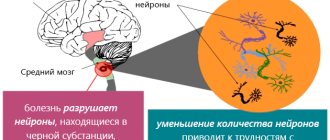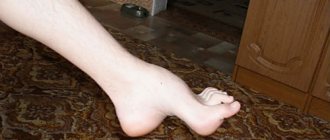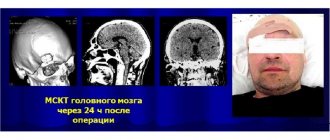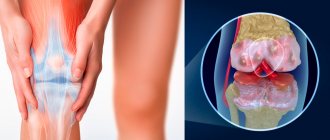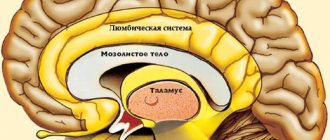Pick's disease: causes, stages, symptoms, diagnosis and treatment
It is impossible to cure Pick's disease completely; there are only techniques to reduce the symptoms. Drug treatment of Pick's disease increases life expectancy and improves its quality. Memantine is used to eliminate negative signs.
During therapy, antidepressants and antipsychotics are used. As an auxiliary treatment, you can conduct training that restores thought processes. Usually these are group classes that help develop information perception and memory. They ask the patient to fully describe his life.
Even with therapy, life expectancy can be increased by no more than 10-15 years. In later stages, patients require 24-hour care and monitoring because they are unable to move independently.
To ensure that your elderly relative has a good quality of life as they age, they need to be aware of the symptoms of the onset of dementia. For example, there are several different types of dementia: atrophic, vascular and mixed.
In atrophic, the brain neurons are first affected. This leads to disorientation, memory loss, deterioration of attention and speech.
Vascular occurs against the background of atherosclerosis. If its development occurred due to a stroke, extensive brain damage is observed. If its cause is ischemia, then the pathology develops slowly. Weakness and cephalalgia appear, memory deteriorates. Due to blood supply disorders, brain neurons begin to be affected.
In the mixed form, there is a combination of cerebral vascular damage and Alzheimer's disease. In this case, atherosclerosis, signs of hypertension, behavioral and thinking disorders, deterioration of intelligence and memory are observed.
If the patient has been diagnosed with dementia, when further treatment for Pick's disease becomes ineffective, a professional caregiver must be hired for him. As the disease progresses, the patient stops walking, chewing food, and recognizing himself in the mirror. He loses interest in communicating with people and doing his favorite things. Epileptic seizures or fainting may occur.
Patients become whiny, touchy, suspicious, and cease to be aware of their illness and inappropriate behavior. Problems begin with the functioning of short-term memory, and almost all memories disappear from long-term memory. The patient gradually becomes a helpless little child, living solely by instincts. He is afraid of even the simplest things, does not recognize his relatives, considering them strangers. He may ask simple questions, but having received an answer, he immediately forgets it and starts asking again. This makes caring for such a person a difficult ordeal.
Communicate with the patient in simple words, slowly. Don't shout, give him a chance to think. Place a bright mark on the bathroom with the toilet, which will serve as a guide for the patient.
It is recommended to cover mirrors or remove them altogether. You should not turn on the radio or TV loudly and for a long time, so as not to frighten or strain the patient’s brain. It is also better to get rid of any sources of noise.
The patient needs to eat regularly and drink plenty of water (this is very important). Try to understand it without words, since as the pathology progresses, speech becomes completely incomprehensible. The patient may also stop speaking altogether. Treat him patiently and carefully.
Frequently remind the patient of his name, your name, and family ties between you. He may not understand complex speech, but he perceives facial expressions and intonation well, so try to speak calmly and with a smile.
Explain to those around you that the person has an illness so that they do not ask unnecessary questions or laugh at him. Because the patient may develop a tendency to wander, he should not be left alone.
Hide sharp objects and medicines from the patient, and deprive him of access to sources of electricity and gas. Also remove from aisles any objects that could be in the way or cause injury.
Pick's disease
In its development, Pick's disease goes through 3 successive stages. In the initial stage, personality changes predominate with the loss of developed moral principles. The person becomes extremely selfish and exhibits antisocial behavior. Disinhibition of instincts and loss of control over one’s actions lead to the immediate realization of instinct (physiological needs, sexual desire), regardless of the environment and situation. The patient’s criticism is significantly reduced and he explains his behavior by saying that he “couldn’t resist,” “it just happened,” “I couldn’t wait.” Against this background, the development of bulimia, hypersexuality and other disorders is possible. Changes in speech come down to repeated repetitions of words, phrases, jokes, stories or secrets (the “gramophone record” symptom). There is euphoria or apathy.
The predominance of certain manifestations in the clinic of the initial period of Peak dementia depends on the localization of the emerging atrophic processes in the brain. Thus, basal frontal atrophy is accompanied by personality disorders, emotional instability, alternating periods of rigidity and disinhibition; convexital atrophy of the frontal lobe - a combination of antisocial behavior with apathy and abulia - loss of motives and desires, complete lack of will. When atrophy predominates in the left hemisphere, behavioral disorders manifest themselves against the background of depression. Right hemisphere atrophy is characterized by inappropriate behavior combined with euphoria.
In the second stage, cognitive impairment appears and increases. Sensorimotor aphasia occurs - the patient cannot formulate his thoughts and loses the ability to understand the speech of others. Alexia, agraphia and acalculia are observed - loss of reading, writing and counting skills. There are amnesia - memory loss, agnosia - a change in the perception of the world and violations of praxis - the ability to consistently perform actions. At first, the disorder of cognitive functions may be episodic, then it becomes permanent and progresses until the complete intellectual destruction of the individual. In a number of patients, cutaneous hyperalgesia (increased sensitivity) becomes a peculiar manifestation.
The third stage of Pick's disease is profound dementia. Patients are immobilized due to extreme apraxia, disoriented, unable to perform basic self-care activities, and require constant care. This condition leads to the death of patients due to cerebral insufficiency or intercurrent infections (infection of bedsores with the development of sepsis, congestive pneumonia, ascending pyelonephritis, etc.).
Description of the disease
According to the literature, Alzheimer's disease is four times more common than Pick's dementia. Due to the rarity and complexity of diagnosis (at least intravital), there is not much data on the disease. It is known for sure that men get sick less often, and the pathology is progressive.
Senile dementia is characterized by severe mental impairment and neurological pathologies. The brain is affected mainly in the frontotemporal area, resulting in impaired behavior and speech.
Pick's disease is often diagnosed against the background of mental disorders, but they are not considered the root cause of the disease, although they provoke its development. Not only the temporal and frontal lobes can undergo atrophy - sometimes it goes beyond and affects the subcortex. In this case, there is no inflammation, vascular disorders are either absent or mild.
The neurodegenerative disease progresses slowly at first, but in the initial stages entire groups of nerve cells die. Over 5-7 years, they can spread to the entire brain, although the focus is observed mainly in the temporal and frontal lobes. First, destructive processes affect the second and third convolutions, and a little later - the first. Less commonly, the parietal lobes may be affected.
The manifestation of Pick's disease begins in the anterior frontal regions of the brain, which immediately affects a person's behavior and personal characteristics. Later, the temporal lobes, which are responsible for intelligence, memory, and concentration, undergo changes. The cortex of the speech analyzer is also destroyed, which immediately affects speech abilities.
Unlike other neurodegenerative pathologies in psychiatry, Pick's disease is characterized by deep damage to the entire lobe of the brain, and not just part of it. First, the upper layers are affected, then the process spreads deeper.
Examination of brain tissue under a microscope showed that patients experience “swelling” of cells, the thickness of the gray matter decreases, the transition from gray to white matter is blurred, and the boundaries are unclear. Another characteristic feature is the separation of the cerebral vascular endothelium. This causes circulatory disorders, stagnation of cerebrospinal fluid and, as a result, enhances neurodegenerative processes and atrophy. Moreover, separation of the endothelium always occurs in Pick's disease, but in Alzheimer's disease - only in 25% of cases.
Features of the disease
Pick's disease can be caused by:
- brain tumor;
- traumatic brain injuries;
- alcohol and psychotropic substance abuse;
- heredity (genetic predisposition to the disease);
- chaotic use of medications (without a doctor’s prescription).
At the initial stage, patients with this pathology may experience changes in behavior, loss of self-control, speech disorder (impaired coherence, fixation) and the appearance of hallucinations. As the disease progresses, patients experience attacks of amnesia, deterioration of vision, hearing and decreased intellectual abilities. At the last stage, the disease is severe: the patient needs constant care, so all the actions of specialists are aimed at improving the patient’s quality of life.
Third stage
Symptoms get worse. Total dementia, complete aphasia, inability to recognize and any purposeful activity occurs. Physical weakness, attacks of which were observed throughout the illness, becomes more pronounced. Despite the fact that real paralysis does not develop in Pick's disease, patients cannot walk, eat, etc. on their own. Subsequently, a vegetative coma develops with a decrease in muscle tone.
There is no specific treatment. With an unfavorable course, death occurs after 3-4 years, with a favorable course - after 10-12 years. The average life expectancy of patients with Pick's disease is about 6 years.
What happens to personality, memory and “instrumental” functions of intelligence
Already at the beginning, Pick's disease causes serious personality changes. Patients become disinhibited, exhibit unmotivated behavior, and spontaneity becomes inaccessible. There is a combination of childishness and impoverishment of general activity.
Even the initial stage of Pick's disease makes patients capable of committing acts that worsen their financial situation and negatively affect their social condition. It happens that they leave home and quit their jobs. For such behavior to occur during Alzheimer's disease, the dementia must progress to a moderate stage. Only then will a person begin to resist leaving and begin to wander.
At the beginning of its occurrence, Pick's disease almost does not affect the basic, “working” functionality of the intellect. We can confidently talk about a slight change in attention, memory, and counting. The person still has good orientation and does not confuse places, times and events. But at the same time, the level of higher mental activity, which includes criticism, generalization, and abstraction, falls.
Deteriorating memory is the first sign of symptoms of Alzheimer's disease. People who are ill are unable to remember new information; they easily forget recent facts. Cognitive impairments occur. Their manifestations are mild or moderate. The initial stages of the disease do not cause destruction of the personality; it remains almost at the same level.
